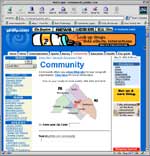Spring 2000
Community Publishing: Faster, Easier, Cheaper, Better
By Ken Doctor
VP/ Strategy
KnightRidder.com
Back in the early ’80s, when voicemail was considered exotic, I happened upon a business card. I know I saved it, probably in one of the boxes of carefully packed clutter that have accompanied our moves from Portland to Boulder to Saint Paul to San Jose.
The card had a simple housepainter motif, a happy, stout man with a carefree brush in his hand. The name: Bill Hamblin, Housepainter. But it was the corners of the card that captured my attention. In each corner, set off in red type, one word per corner:
As good as they describe what we’d all like in a housepainter, they’re better in describing the medium now transforming the business world, our individual lives and our communities.
While we in the news media once mistook the Internet for an adjunct medium to distribute our stories, the world has plainly come to the Net for simpler, more universal, more human needs. Getting stuff faster, cheaper, easier and better.
We’ve seen that revolution begin among users and readers. Now we’re seeing it strongly among buyers and sellers.
A Third Revolution
Now, there’s a third revolution to which we should pay attention. While we were late to the user/reader and buyer/ seller revolutions (and our businesses are paying the price), we can get in early on the third revolution.
That’s the revolution of community empowerment-of providing tools to allow community organizations, real-world terrestrial organizations like the Boy and Girl Scouts, churches and temples, local schools, to do their work faster, cheaper, easier and better.
Think about the soccer leagues, the dance groups, the after-school programs you are involved in.
“Community” on the Net has been a confusing thing, often indicating the electronic, distanced ability of people of close interests and disparate geographies to come together, to create a sense of group. Companies, valued in the hundreds of millions of dollars, have already come and gone in that electronic space. Now, with Internet penetration reaching almost half of America’s households, real, local community is taking on a new meaning.
Redefining Community
While the web is wonderful at letting us click anywhere around the globe, most of us still live our lives in a real neighborhood, a real city.
At KnightRidder.com, we believe that we – and America’s other established community media institutions-need to be where we know the territory best. And that’s where the web touches real life.
So community publishing has been born. It enables community organizations – using software tools provided by the newspaper and their partner companies like Koz and Waveshift – to set up their own web sites.
That’s just the beginning, impressive as it is in such areas as Philadelphia, Dallas and Bergen County, New Jersey.
Community empowerment will mean much more than setting up web sites. Look at what community organizations need. The web is suited to making each and every function faster, cheaper, easier and better. Through community publishing, the web can:
Imagine a world in which the web aids every one of those functions. A web site that can be updated on the fly with a complete calendar of all meetings. Discussion areas for issues. The ability to e-mail members or subgroups. To send news releases and article ideas directly to local media (and to post relevant P.R. photos). To list volunteer openings on an organization’s own site and on general volunteer sites. The ability to “reverse publish” community calendar information in a newspaper’s zoned neighbors sections. And, most revolutionary, the ability to raise money online.
We’ve already seen the power and seduction of e-commerce. Now we’re entering an age, foreshadowed last Christmas, in which non-profits can get a percentage of online commerce. Plus, they can do their own online fundraising, allowing people to do good – you guessed it, faster, cheaper, easier and better.
Time to Take The Lead
Will news organizations take the lead here, in empowering the tens of thousands of groups that form our civic life or will we dither? Will we wrap ourselves in internal arguments about our proper community role and again let upstart companies redefine “community” for us?
I hope we’ve learned our lessons. We’re embracing community commerce, figuring how best to link local buying and local fundraising.

In our company, Philly.com has been a leader, having signed up more than 800 local groups for its community site. Every week, community items supplied via the web find their way into The Philadelphia Inquirer’s neighbors sections. Now we’re intending to turn these first steps into real, fast-moving programs all over the country.
What must local media institutions do to take the lead?
___________________________________
KnightRidder.com, San Jose, CA, operates the Real Cities network of regional web portals. Doctor was VP/editorial for Knight Ridder New Media, 1997-1999. Previously, he served as the Saint Paul Pioneer Press managing editor, leading several civic journalism projects. He can be reached at kdoctor@realcities.com or 408-938-6150.
